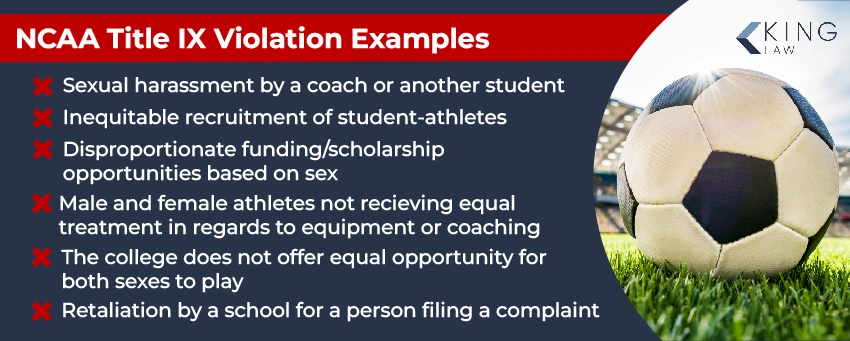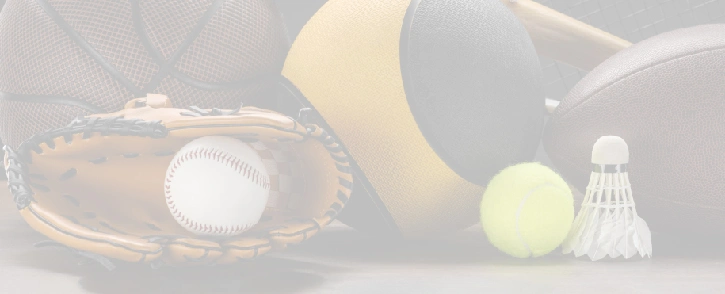
NCAA Title IX Lawyers for Athletes and Coaches
The National Collegiate Athletic Association (NCAA) is a non-profit, member-led organization that serves nearly 1,100 colleges and universities throughout the country. The NCAA is dedicated to promoting the health and well-being of college athletes and runs championships and programs for all students at the schools within their organization.
Student-athletes and coaches at NCAA schools are required to comply with Title IX, a federal law that prohibits sex-based discrimination in athletic programs. Failure to comply with Title IX can result in significant consequences, including expulsion from school or a job position. At King Law, our attorneys provide experienced legal counsel for individuals facing NCAA Title IX allegations. Contact our office today to schedule a free, no-obligation consultation.
On this page:
NCAA Title IX Rules and Regulations
NCAA and Title IX: The History of Title IX in College Sports
What Title IX Does Not Protect Against in the NCAA
The Most Common NCAA Title IX Cases
What To Do if Accused of an NCAA Title IX Violation
NCAA Title IX Investigations: The Timeline and Process
NCAA Title IX Reporting Requirements
How to File an NCAA Title IX Complaint
NCAA Title IX Attorneys for Athletes, Coaches, and Coaching Staff
NCAA Title IX Rules and Regulations – 2025 Updates
January 2024: It is speculated that the proposed rule changes will again miss their March 2024 deadline after major regulatory milestones are missed.
December 2023: Proposed rule changes are delayed until March, among a growing number of comments.
April 2023: The U.S. Department of Education released a notice of proposed rulemaking (NPRM) on athletic eligibility under Title IX. The rule would prohibit schools from banning transgender students from participating on a sports team that is consistent with their gender identity.
NCAA and Title IX: The History of Title IX in College Sports
Title IX of the Education Amendments Act of 1972 is a federal civil rights law that protects students, faculty, and staff at educational institutions across the country from discrimination based on sex. Programs within educational institutions, including any private or public schools receiving federal funding, are also subject to Title IX compliance. The intent of Title IX is to provide equal educational opportunities for all students.
Recent Changes to NCAA Title IX and Challenges
In April 2023, the U.S. Department of Education released a notice of proposed rulemaking (NPRM) on athletic eligibility. The notice indicated the Department’s intent to prohibit schools from banning transgender students from participating on a sports team that is consistent with their gender identity. The rule also requires education institutions to provide a “framework for developing eligibility criteria that protects students from being denied equal athletic opportunity.” Due to the volume of public comments received on the proposed rule change, implementation was delayed.
NCAA Title IX Violations
Title IX covers a wide range of violations on college and university campuses. In NCAA athletic programs, Title IX generally applies to three areas: participation, scholarships, and other benefits.
NCAA Title IX requires:
- Participation: Men and women are to be provided equitable opportunities when it comes to participation in sports. While an educational institution does not have to offer identical sports, it must offer an equal opportunity to play.
- Scholarships: Educational institutions must provide student-athletes with athletics scholarship dollars proportional to their participation, regardless of their sex.
- Other benefits: Male and female student-athletes must receive equal treatment when it comes to provisions such as equipment, scheduling of games, coaching, etc.
Title IX also prohibits any type of gender discrimination, sexual harassment, sex violence, retaliation, or the creation of a hostile environment. Individuals who have been accused of violating Title IX are strongly encouraged to contact a Title IX defense attorney.
NCAA Title IX Violation Examples:
Unfortunately, NCAA Title IX violations still commonly occur on college and university campuses across the country. Men and women continue to receive inequitable treatment when it comes to athletic programs.
Common NCAA Title IX violations include:
- Sexual harassment by a coach or another student
- Inequitable recruitment of student-athletes
- Disproportionate funding or scholarship opportunities based on sex
- Male and female student-athletes not receiving equal treatment when it comes to equipment or coaching.
- A college not offering an equal opportunity for both sexes to play.
- Retaliation by a school for a person filing a complaint.
Title IX does not just apply to student-athletes, it applies to nearly every aspect of collegiate life. Allegations of a Title IX violation can deeply impact a person’s life and should be handled by an experienced attorney.

What Title IX Does Not Protect Against in the NCAA
While Title IX requires that male and female students receive equitable opportunities when it comes to athletics, it does not require that a school spend the same amount of money on sports programs for each gender.
Male and female students must receive equitable treatment and benefits. However, when it comes to scholarships, equal amounts of money must be spent proportional to participation. Additionally, a school does not need to offer identical athletic programs for both males and females to be in compliance with Title IX.
The Most Common NCAA Title IX Cases
Title IX cases frequently make headlines, from coaches who routinely make sexually explicit comments to their student-athletes or universities who fail to implement equitable athletic programs.
Common NCAA Title IX cases:
- A university cuts several sports for one gender, citing budget constraints.
- A coach consistently makes sexist innuendos or inappropriate remarks to their team.
- A student-athlete is accused of sexually assaulting another student.
- Recruitment efforts by a college or university solely focus on one gender.
- Male and female sports programs at a college are not offered equitable equipment.
- An assistant coach is fired in retaliation for filing a complaint.
While Title IX violations do happen at campuses nationwide, false allegations are also filed against students, coaches, faculty, and staff. If you were wrongfully accused of violating Title IX, you need to contact an attorney as soon as possible.
What To Do if Accused of an NCAA Title IX Violation
If you are accused of an NCAA Title IX violation, it is important to remember not to panic. An accusation is merely the beginning of the process, not the final outcome. In order to ensure the best possible outcome in your case, you should seek legal advice as early in the process as possible.
An attorney can help you understand your school’s Title IX procedures and guide you through the process. In most cases, you will need to prepare a statement, collect evidence, and participate in proceedings. You are entitled to representation throughout the process. Exercising this right is strongly encouraged.
NCAA Title IX Investigations: The Timeline and Process
An NCAA Title IX investigation can be lengthy. Colleges and universities are required to fully investigate any formal complaints. The administrators handling the allegations are required to be trained and must evaluate the claim without bias. You are presumed innocent until otherwise proven. It is imperative to remain respectful throughout the process and know that you do have the opportunity to appeal an unfavorable decision.
After a formal complaint is filed, the school will begin an investigation. During this time, both parties may submit evidence to help substantiate their claims. Parties have the right to an advisor which may be an attorney and each has a right to access evidence submitted in the case. There may be formal hearings or the opportunity for mediation prior to a decision being rendered.
NCAA Title IX Reporting Requirements
All colleges and universities receiving federal funding must be in compliance with Title IX. Federal law mandates that schools have a Title IX coordinator to help oversee any formal complaints or alleged violations. Title IX coordinators are required to be trained in a number of areas, including sexual harassment, prevention, and response.
To file an NCAA Title IX violation, the process below is usually followed:
- Contact your school’s Title IX coordinator.
- Report the incident directly to the Title IX coordinator.
- Ask your coordinator about next steps
- Collect any evidence you may need to prove your case.
Compliance with Title IX is critical. Any accusations of a violation can damage your reputation, your professional career, and your education.
How to File an NCAA Title IX Complaint
In order to make a Title IX complaint, you can file it directly through the Title IX coordinator at your university or through the Office of Civil Rights. Anyone can file a Title IX complaint. It does not have to be the alleged victim. Additionally, most faculty and staff on a college or university campus are considered mandatory reporters who must report suspicions of harassment, assault, or abuse.
NCAA Title IX Attorneys for Athletes, Coaches, and Coaching Staff
At King Law, our staff has extensive experience representing athletes, coaches, and staff who have been accused of violating Title IX. We will help you navigate the accusations and provide in-depth representation throughout the proceedings.
Contact an NCAA Title IX Lawyer
Were you accused of violating Title IX? Our legal team will provide you with the counsel you need throughout the process. We have years of experience helping coaches, student-athletes, staff, and administrators who have been accused of violating the federal law. Contact our office today to get started.
NCAA Title IX Resources
U.S. Department of Education – Office for Civil Rights
Learn more about Title IX violations and how the OCR enforces Title IX at schools nationwide.
OCR Complaint Form
File a complaint through the Office for Civil Rights. You can also email OCR@ed.gov or call 800-421-3481.
NCAA Title IX
Answers frequently asked questions about how Title IX applies to NCAA athletics at college and university campuses throughout the country.

